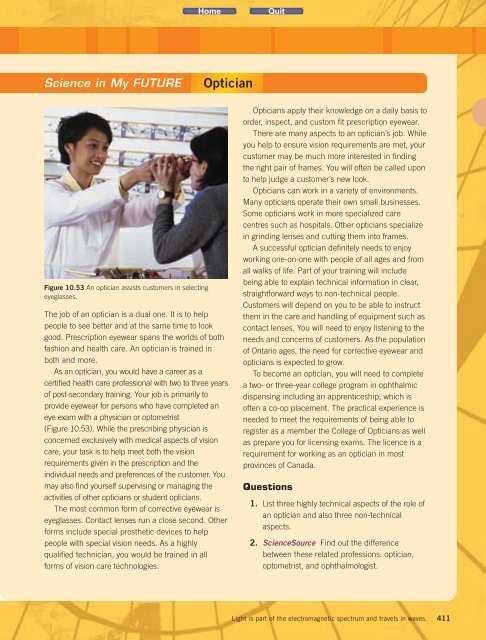is10_sb_unit_d
is10_sb_unit_d
is10_sb_unit_d
Create successful ePaper yourself
Turn your PDF publications into a flip-book with our unique Google optimized e-Paper software.
Science in My FUTURE Optician<br />
Figure 10.53 An optician assists customers in selecting<br />
eyeglasses.<br />
The job of an optician is a dual one. It is to help<br />
people to see better and at the same time to look<br />
good. Prescription eyewear spans the worlds of both<br />
fashion and health care. An optician is trained in<br />
both and more.<br />
As an optician, you would have a career as a<br />
certified health care professional with two to three years<br />
of post-secondary training. Your job is primarily to<br />
provide eyewear for persons who have completed an<br />
eye exam with a physician or optometrist<br />
(Figure 10.53). While the prescribing physician is<br />
concerned exclusively with medical aspects of vision<br />
care, your task is to help meet both the vision<br />
requirements given in the prescription and the<br />
individual needs and preferences of the customer. You<br />
may also find yourself supervising or managing the<br />
activities of other opticians or student opticians.<br />
The most common form of corrective eyewear is<br />
eyeglasses. Contact lenses run a close second. Other<br />
forms include special prosthetic devices to help<br />
people with special vision needs. As a highly<br />
qualified technician, you would be trained in all<br />
forms of vision care technologies.<br />
Opticians apply their knowledge on a daily basis to<br />
order, inspect, and custom fit prescription eyewear.<br />
There are many aspects to an optician’s job. While<br />
you help to ensure vision requirements are met, your<br />
customer may be much more interested in finding<br />
the right pair of frames. You will often be called upon<br />
to help judge a customer’s new look.<br />
Opticians can work in a variety of environments.<br />
Many opticians operate their own small businesses.<br />
Some opticians work in more specialized care<br />
centres such as hospitals. Other opticians specialize<br />
in grinding lenses and cutting them into frames.<br />
A successful optician definitely needs to enjoy<br />
working one-on-one with people of all ages and from<br />
all walks of life. Part of your training will include<br />
being able to explain technical information in clear,<br />
straightforward ways to non-technical people.<br />
Customers will depend on you to be able to instruct<br />
them in the care and handling of equipment such as<br />
contact lenses. You will need to enjoy listening to the<br />
needs and concerns of customers. As the population<br />
of Ontario ages, the need for corrective eyewear and<br />
opticians is expected to grow.<br />
To become an optician, you will need to complete<br />
a two- or three-year college program in ophthalmic<br />
dispensing including an apprenticeship, which is<br />
often a co-op placement. The practical experience is<br />
needed to meet the requirements of being able to<br />
register as a member the College of Opticians as well<br />
as prepare you for licensing exams. The licence is a<br />
requirement for working as an optician in most<br />
provinces of Canada.<br />
Questions<br />
1. List three highly technical aspects of the role of<br />
an optician and also three non-technical<br />
aspects.<br />
2. ScienceSource Find out the difference<br />
between these related professions: optician,<br />
optometrist, and ophthalmologist.<br />
Light is part of the electromagnetic spectrum and travels in waves.<br />
411


